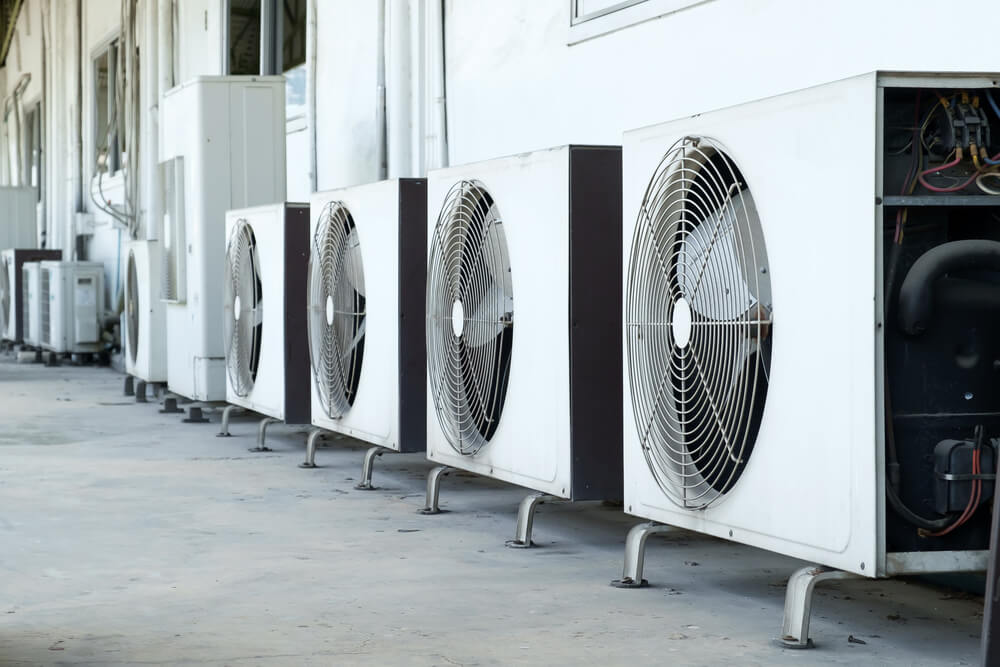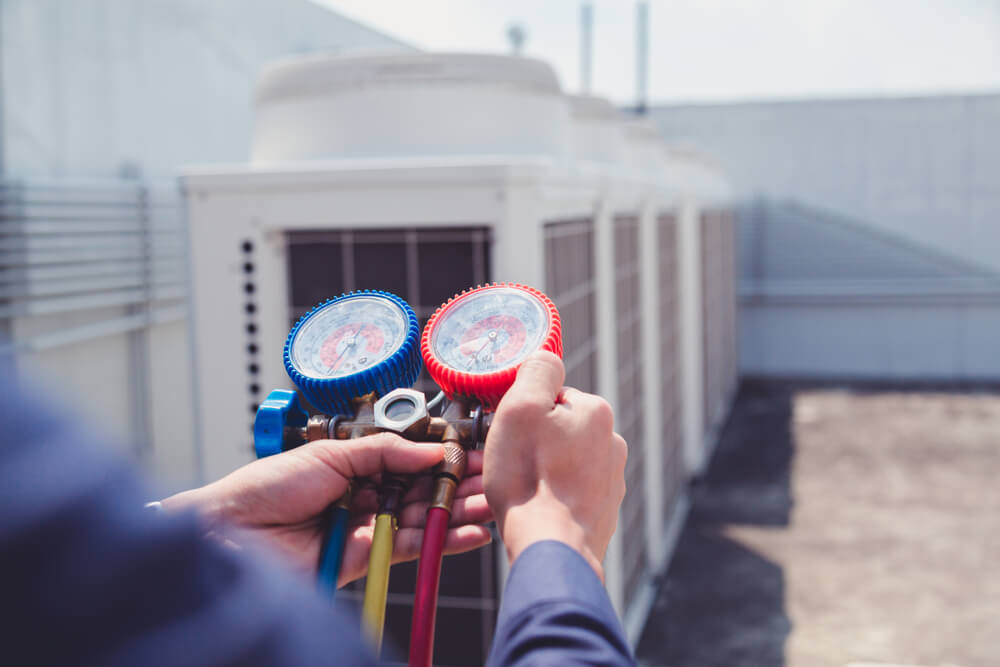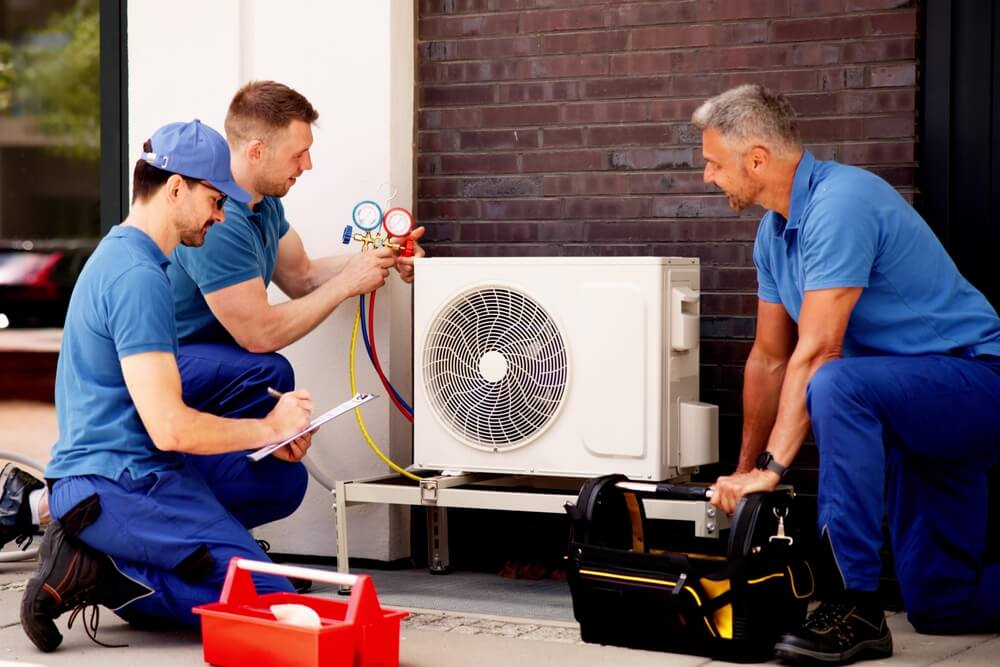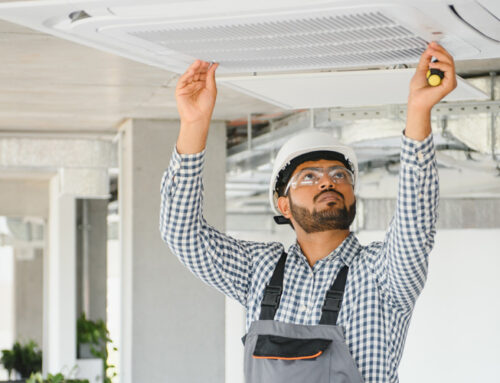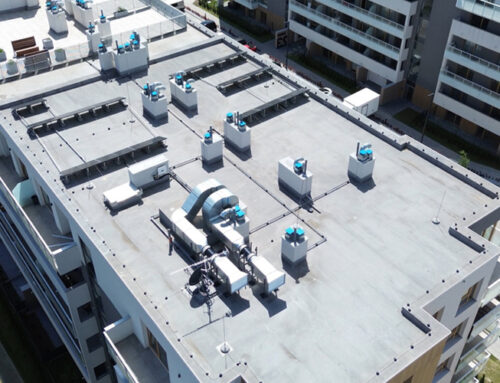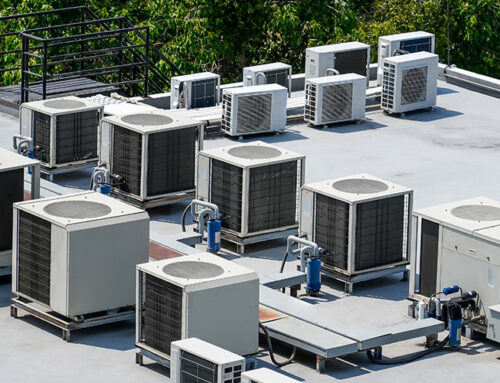In today’s commercial environments, maintaining optimal air quality is just as crucial as temperature control, especially for contractors striving to create healthy and productive spaces.
The role of air quality control in commercial air conditioning systems has become a cornerstone of modern HVAC solutions, as poor indoor air quality can hinder employee productivity and well-being. High-efficiency systems now go beyond cooling, incorporating advanced filtration and humidity regulation to ensure cleaner, healthier air.
As contractors face the challenges of traditional processes, embracing state-of-the-art air conditioning solutions positions them as industry leaders, paving the way for workplaces where air quality becomes a key ally in enhancing employee satisfaction and performance. We at Chills AC are determined to help our clients, so today we are bringing you more information about the role of air quality control.
Importance of Air Quality in HVAC
Impact on Productivity and Health
The impact of air quality on productivity and health within a workplace cannot be overstated. Poor air quality in commercial environments can lead to a range of health issues, such as respiratory problems and allergies, which can increase absenteeism and reduce employee efficiency. When air quality is compromised, workers often experience fatigue, headaches, and a lack of concentration, all of which directly affect productivity levels.
By prioritizing air quality control in commercial HVAC systems, businesses can mitigate these adverse effects. Advanced air conditioning systems equipped with high-efficiency filters can remove harmful particles and allergens, promoting a healthier work environment. Furthermore, maintaining optimal humidity and ventilation reduces the risk of airborne diseases, fostering a space where employees can thrive.
Ultimately, investing in air quality improvements is an investment in the well-being and productivity of the workforce, creating a positive ripple effect throughout the organization.
Addressing Workplace Air Quality Challenges
Addressing workplace air quality challenges is crucial for creating a healthy and productive environment. One of the primary challenges is the presence of pollutants and allergens that can circulate through commercial HVAC systems. To combat this, businesses should incorporate high-efficiency particulate air (HEPA) filters or similar advanced filtration technologies.
These filters capture fine particles, reducing the concentration of harmful substances in the air. Another challenge is regulating humidity levels to prevent mold growth, which can trigger respiratory issues. Commercial air conditioning systems equipped with humidity control features help maintain an optimal indoor climate. Additionally, implementing regular maintenance schedules for HVAC systems ensures they operate efficiently and effectively.
By proactively addressing these challenges, contractors can transform traditional air quality control processes, positioning themselves as leaders in the field. Through strategic air quality management, businesses can enhance workplace air quality, leading to improved employee health, comfort, and overall satisfaction.
Air Quality and Commercial HVAC Systems
Air quality is a critical consideration in the design and operation of commercial HVAC systems. These systems are more than just temperature regulators; they play a pivotal role in maintaining clean and healthy air within commercial spaces. The integration of advanced filtration and ventilation technologies in commercial HVAC systems can significantly enhance workplace air quality.
By incorporating features such as HEPA filters and UV light systems, these units can effectively remove contaminants like dust, pollen, and bacteria, improving the overall air quality within a workplace. Proper ventilation is equally important, ensuring a consistent supply of fresh outdoor air while preventing the buildup of indoor pollutants. In commercial settings, where large numbers of people may occupy the same space, maintaining superior air quality is essential for preventing the spread of airborne illnesses and enhancing occupant well-being.
Thus, a well-designed and maintained commercial HVAC system is indispensable for fostering a healthier work environment.
Advanced Filtration Techniques
Role of HEPA Filters in Commercial AC
HEPA filters play a vital role in enhancing air quality within commercial air conditioning systems. These filters are designed to capture at least 99.97% of airborne particles, including dust, pollen, mold spores, and even some bacteria and viruses. Their effectiveness makes them a critical component in commercial HVAC systems, especially in environments such as offices, schools, and healthcare facilities where maintaining high air quality is paramount.
By trapping fine particles, HEPA filters prevent these contaminants from circulating in the air, reducing health risks associated with poor indoor air quality. Incorporating HEPA filters into commercial AC units not only improves air quality but also contributes to a cleaner, more comfortable working environment. Regular maintenance and timely replacement of these filters ensure optimal performance and longevity of the HVAC system.
As contractors embrace these advanced filtration techniques, they provide businesses with the tools to safeguard employee health and enhance workplace productivity.
Removing Pollutants and Allergens
Removing pollutants and allergens from indoor environments is essential for maintaining optimal air quality in commercial spaces. Advanced filtration techniques in HVAC systems are specifically designed to tackle this challenge. Filters, such as HEPA and carbon filters, are effective at capturing a wide range of airborne contaminants, including dust, pollen, mold spores, and volatile organic compounds (VOCs).
These pollutants can exacerbate allergies and respiratory issues, impacting employee health and productivity. By integrating these filters into commercial HVAC systems, businesses can significantly reduce the presence of harmful particles, creating a healthier and more comfortable environment for occupants. Regular maintenance and replacement of filters are crucial to ensure their efficiency in trapping contaminants.
Additionally, advanced HVAC systems often include features like UV lights that can further help in neutralizing bacteria and viruses.
Humidity Control in Commercial Spaces
Managing Mold and Comfort Levels
Effective humidity control is vital in managing mold growth and ensuring comfort levels in commercial spaces. High humidity can create an ideal environment for mold and mildew, posing significant health risks and potentially damaging building materials. Mold spores, once airborne, can cause allergic reactions and respiratory problems, making it crucial to maintain proper humidity levels. Commercial HVAC systems with integrated dehumidification features can help achieve this by regulating indoor moisture levels. By maintaining humidity levels between 30% and 50%, these systems prevent mold growth and ensure a comfortable environment for occupants.
Additionally, balanced humidity levels contribute to thermal comfort, reducing the need for drastic temperature adjustments and optimizing energy efficiency. Regular inspection and maintenance of HVAC components, such as condensate drains and drip pans, are essential in preventing moisture buildup. Through proactive humidity management, businesses can create healthier, more comfortable workplaces that enhance employee well-being and productivity.
Balancing Indoor Humidity for Health
Balancing indoor humidity is crucial for health and comfort in commercial environments. Excessive humidity can lead to problems such as mold growth and dust mites, while too little humidity can cause dry skin, throat irritation, and respiratory discomfort. Maintaining an ideal humidity range of 30% to 50% is essential for supporting a healthy indoor atmosphere.
Commercial HVAC systems equipped with humidifiers and dehumidifiers can help achieve this balance by adjusting moisture levels according to real-time indoor conditions. Proper humidity control not only protects occupants’ health but also preserves the structural integrity of the building by preventing moisture-related damage. Moreover, balanced humidity improves air quality by minimizing airborne allergens and pathogens.
Regular monitoring and maintenance of HVAC systems ensure they function effectively, providing consistent humidity control. By prioritizing humidity balance, businesses can enhance employee well-being and productivity, creating a workplace environment that promotes overall health and satisfaction.
Smart Technology Integration
Real-Time Air Quality Monitoring
Real-time air quality monitoring is a game-changer for managing indoor environments in commercial spaces. By integrating smart technology into HVAC systems, businesses can continuously track and adjust air quality parameters to ensure a healthy atmosphere. Sensors embedded in these systems measure levels of pollutants, humidity, and carbon dioxide, providing instant feedback on indoor air quality.
This data allows HVAC systems to make automatic adjustments, optimizing ventilation rates and filtration processes in response to real-time conditions. Real-time monitoring not only helps maintain optimal air quality but also enhances energy efficiency by avoiding unnecessary heating, cooling, or ventilation. Furthermore, this technology can alert building managers to potential issues before they become significant problems, allowing for timely interventions.
By harnessing the power of smart technology, businesses can create a proactive approach to air quality management, ensuring a consistently healthy and comfortable environment for all occupants. This ultimately supports better health outcomes and improved productivity in the workplace.
Energy Efficiency through Smart Controls
Smart controls in commercial HVAC systems significantly enhance energy efficiency, leading to cost savings and environmental benefits. These controls use algorithms to optimize system operations based on real-time data from sensors that monitor temperature, humidity, and occupancy levels. By precisely adjusting heating, cooling, and ventilation in response to current conditions, smart controls minimize energy waste.
For instance, during low occupancy periods, systems can reduce ventilation rates, conserving energy without compromising air quality. Additionally, predictive maintenance features can identify potential system faults before they escalate, reducing downtime and extending equipment life. Smart controls also integrate seamlessly with building management systems, allowing for centralized monitoring and adjustments.
This holistic approach to energy management not only lowers utility bills but also supports sustainability goals by reducing greenhouse gas emissions.
Benefits of Improved Air Quality
Enhancing Employee Productivity and Comfort
Improved air quality is a key factor in enhancing employee productivity and comfort in the workplace. Clean air, free from pollutants and allergens, reduces health issues such as headaches, fatigue, and respiratory problems, leading to fewer sick days and higher productivity levels. A comfortable indoor environment, with optimal temperature and humidity, significantly contributes to employee satisfaction and performance.
When the air quality is high, cognitive functions such as concentration, memory, and problem-solving improve, facilitating better work outcomes. Additionally, a healthy work environment fosters a positive organizational culture, where employees feel valued and motivated. This, in turn, can lead to higher retention rates and attract talent. By investing in air quality improvements through advanced HVAC systems, businesses demonstrate a commitment to employee well-being, which enhances morale and productivity.
Ultimately, the benefits of improved air quality translate into a thriving workplace where employees can perform at their best.
Long-term Health and Organizational Benefits
Improved air quality in commercial spaces yields significant long-term health and organizational benefits. By reducing exposure to pollutants and allergens, businesses can lower the incidence of chronic respiratory conditions and allergies among employees.
This proactive approach to health can lead to decreased healthcare costs and insurance claims for the organization. Furthermore, healthier employees are more likely to be engaged and productive, contributing positively to the company’s success. From an organizational perspective, prioritizing air quality can enhance the company’s reputation as a responsible and caring employer, attracting and retaining top talent.
Companies that invest in superior indoor air quality also align with broader sustainability and wellness initiatives, positioning themselves as industry leaders in environmental stewardship. Over time, these efforts lead to a more resilient workforce, improved bottom lines, and the ability to meet corporate social responsibility goals.
Ultimately, prioritizing air quality is a strategic investment in both employee well-being and organizational success. The task of our company is to do exactly that, so contact us today to find out more information and get guidance and support!

